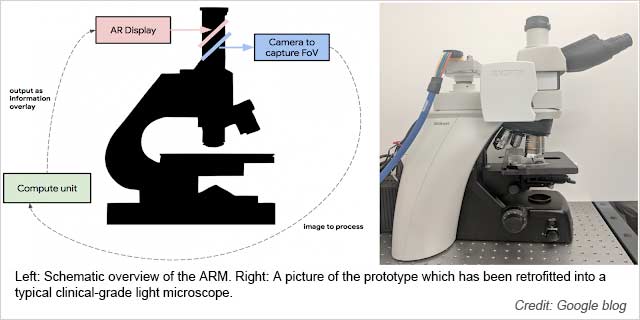
Google’s AI-powered microscope outlines cancer cells using augmented reality


Internet giant Google is working on a microscope that deploys artificial intelligence (AI) to detect cancer cells in a tissue and uses augmented reality (AR) to highlight them for the medical examiner peering through the eyepieces. Importantly, the AR-powered prototype can be fitted into microscopes found in hospitals and clinics around the world using low-cost, readily-available components.
The microscope creates a digital representation of the slide being checked under the lens, and then feeds that representation to AI for cancer detection. After the cancer cells have been spotted, the microscope highlights them in the slide itself using AR.
Present techniques use no digital representation of the slide being checked under the microscope, said Martin Stumpe, technical lead, and Craig Mermel, product manager, Google Brain Team. The researchers said that once slides are digitised, many more people can use AI to detect cancer and boost research.

Google Brain Team has already published results that show AI can detect breast cancer metastases in lymph nodes at a level of accuracy comparable to a trained doctor or a pathologist. Metastasis is the development of tumours in different parts of the body resulting from cancer that has started in another part of the body.

As AI engines gets smarter, the primary healthcare segment will see a lot of input in the form of analysis.
Already, IBM Watson, an AI platform for business, detects complex diseases and suggests treatments. "We are also likely to see more robots appearing in people’s homes with the ability to help them cope with disability and illness. Care and companionship robots are expected to become popular and could begin to become an everyday reality in 2018," said Bernard Marr, bestselling author and AI expert.

AI will invade not just healthcare. According to technology research firm Gartner, there will be a huge influx of AI in personal devices. The firm has predicted that by 2022, personal devices will know more about an individual's emotional state than his or her own family.
"Emotion AI systems and affective computing are allowing everyday objects to detect, analyse, process and respond to people's emotional states and moods to provide better context and a more personalised experience," said Roberta Cozza, research director at Gartner. "To remain relevant, technology vendors must integrate AI into every aspect of their devices, or face marginalisation."
Even in the startup space, predictive analytics and artificial intelligence (AI) are helping home rental firm NestAway streamline operations by performing tasks such as calculating rent.

